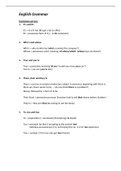English Grammar
Common errors
1. It’s and its
It’s = it is/it has (it’s got a lot to offer)
Its = possessive form of it (… to its customers)
2. Who’s and whose
Who’s = who is/who has (who’s running this company?)
Whose = possessive word, meaning ‘of whom/which’ (whose keys are those?)
3. Your and you’re
Your = possessive meaning ‘of you’ (could you move your car?)
You’re = you are (you’re late)
4. There, their and they’re
There = used as an empty introductory subject in sentences beginning with there is,
there are, there seems to be, … (do you think there is a problem?)
Always followed by a form of to be
Their (hun) = possessive pronoun (investors had to sell their shares before October)
They’re = they are (they’re coming to see the show)
5. To, too and two
To = preposition (= voorzetsel) (this belongs to David)
Too = synonym for also (I am going to the concert too)
indicates excessiveness (I’m not buying this car, it is far too expensive)
Two = number 2 (Tim has only got two friends)
,6. Some and any
Some (+)
In affirmative sentences (she’s got some interesting suggestions)
In requests and offers (would you like some coffee?)
To indicate an approximate number (some 30 part-time workers were laid off)
Any (?/-)
Negative sentences and after words like never, without, hardly, little, …
(she hasn’t gotten any interesting suggestions)
Questions
(do you have any suggestions?)
Affirmative sentences
(any suggestion would be welcome)
Countable vs uncountable
Countable = can be put in plural, can be counted (one table, two tables, …)
Uncountable = no plural form, cannot be counted (one hate, two hates, …)
7. Much and many / a lot of and lots of
Much
Singular uncountable (he has too much money)
Comparative form (it’s much easier that way)
Verbs often referring to change (he hasn’t changed much)
Many
Plural countable (No country in the world has cut so many jobs before)
Typical error is to use much where many should be used
(he has so much ideas -> he has so many ideas)
A lot of = countable and uncountable (I don’t have a lot of time)
Lots of = countable and uncountable (We’ve got lots of things to do)
These alternatives are less formal than much and many
8. Few / a few and little / a little
Few = plural, countable (= not many) (few solutions are as effective)
A few = plural, countable (= some) (I have a few suggestions to make)
Little = singular, uncountable (= not much) (I have little hope it will improve)
A little = singular, uncountable (= a bit) (You seem a little upset)
,9. Fewer vs. less and fewer vs. least
Less – (the) least = singular, uncountable with adjectives or verbs
(.. are paying less attention to stocks)
Fewer – (the) fewest = plural, countable
(Merrill employs 33% fewer people than at it’s peak)
10. Number and amount
Number = plural, countable (caused by a number of factors)
Amount = singular, uncountable (it would reduce the amount of cash)
11. Of / Off
Of = (= van) (the chief executive officer of Coca-Cola)
Off = in expressions like have a day off, … (Off we go)
12. Than and then
Than = after a comparative (Admiral has more than 900,000 customers)
Then = time or occasion (Since then, shares have lost nearly 450 points)
13. Teach and learn
Teach = give knowledge, training, … (She taught English to foreign students)
Learn = (= wetenschappelijk) (A learned person/Learned books)
Irregular verb forms
Learn – learnt – learnt (also learned – learned, in AE)
Teach – taught – taught
14. Lay and lie – Raise and rise
Lay = irregular verb, causative meaning (cause to lie = iets leggen), direct object
Lie = irregular verb
Raise = regular verb, causative meaning (cause to rise), direct object
Rise = irregular verb, have several meanings (get higher/go up)
Lay (something) = leggen
Lie (down) = liggen
, To be – to have (got) – to do
Be, have and do = frequently used verbs
1. To be
Principal forms: be – was/were – been
Present form of to be
Positive (+) Negative (-) Interrogative (?)
I am I am not am I?
you are you are not are you?
he/she/it is he/she/it Is not is he? she? it?
we/you/they are we/you/they are not are we?
Contractions: ‘m = am aren’t = are not
‘re = are isn’t = is not
‘s = is
Negative interrogative
Negative interrogative Full form Contractions
Am I not? Aren’t I?
Are you not? Aren’t you?
Is he/she/it not? Isn’t he/she/it?
Are we not? Aren’t we?
Are you not? Aren’t you?
Are they not? Aren’t they?
Past form of to be
Positive (+) Negative (-) Interrogative (?)
I was I was not was I?
you were you were not were you?
he/she/it was he/she/it was not was he? she? it?
we/you/they were we/you/they were not were we?
Contractions: wasn’t = was not
weren’t = were not




